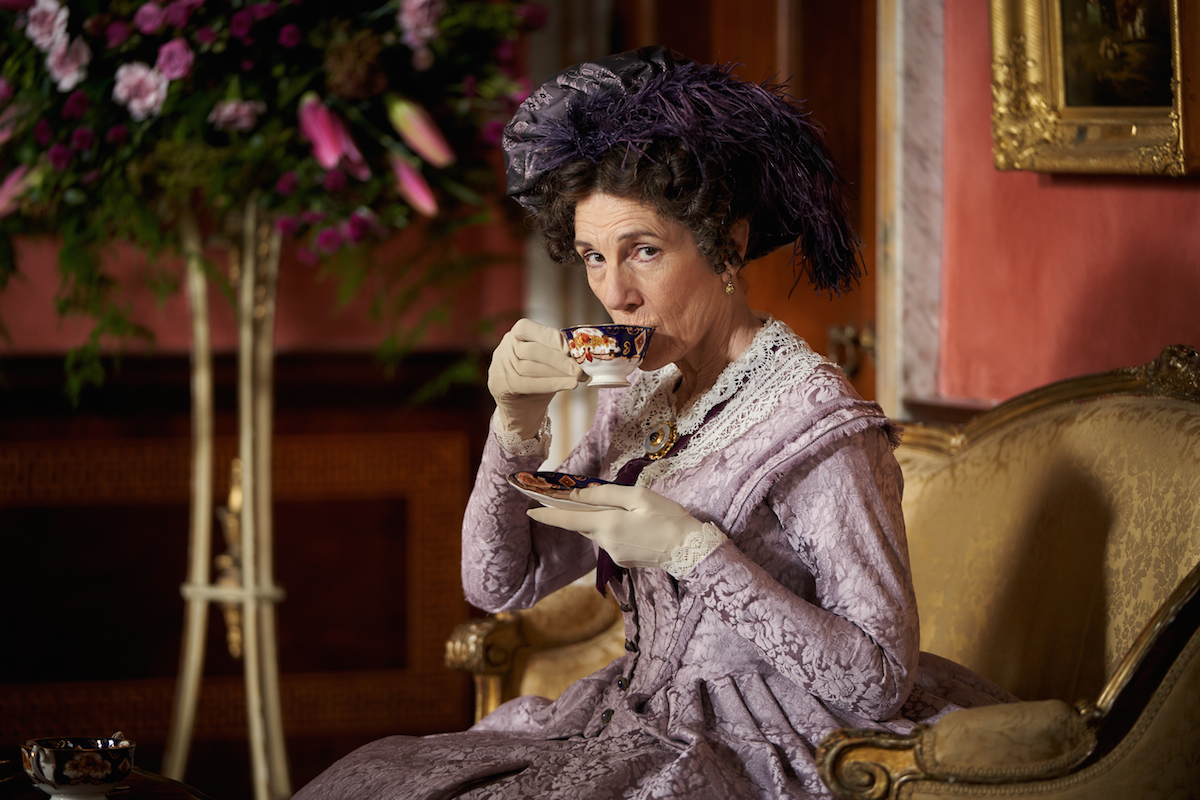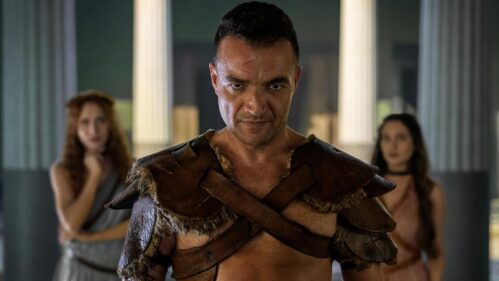In the opening moments of Epix’s six-part original series, “Belgravia,” Anne Trenchard (Tamsin Greig) acknowledges the absurdity of her family attending a ball when their country is perched on the brink of war. It’s not unlike reviewing a television show in the midst of a peaking pandemic, and yet, considering that it is our present responsibility to stay at home in order to protect one another, bingeable viewing options to temporarily divert our attention and ease our minds have become more crucial than ever. Prior to its U.S. premiere this Sunday, April 12th, “Belgravia” debuted in the U.K. on March 15th, just as shelter-in-place laws were beginning to be enforced in both countries to combat COVID-19. It is the sort of global crisis that causes us to question the societal barriers that normally divide our species, blinding us to our true status as one human family. “Belgravia” is an entertainment, first and foremost—and a cracking good one at that—but it also serves as a biting critique of the unearned shame spurred by prejudice that severs our connection from those we love.
Adapted by Julian Fellowes from his own 2016 novel, this handsomely mounted miniseries may be set largely in London during the 1840s, yet it feels no different from the high society of New York City circa 1870s portrayed by Edith Wharton in The Age of Innocence, “a world balanced so precariously that its harmony could be shattered by a whisper.” The simple act of hand-holding carries more erotic tension than most sex scenes, as young lovers boldly defy their given stations, opting to prioritize their happiness over the expectations of their elders. For its twenty-minute prologue, “Belgravia” chronicles the hours leading up to 1815’s bloody battle of Waterloo, as Trenchant’s daughter, Sophia (Emily Reid), warns her mother against “another kind of snobbery.” Anne’s fear that no good could come from Sophia being romantically entangled with Lord Edmund Bellasis (Jeremy Neumark Jones), a man ranking far above her class, is quickly dwarfed by the shattering toll of war. Though the carnage remains unseen, it causes the Trenchards’ house to visibly shudder, as if awaiting an inevitable tragedy destined to upend the lives of its inhabitants.
The main action begins once the story jumps ahead twenty-six years, where Anne and her husband James (Philip Glenister) have become part of the “nouveau riche,” thanks to his efforts in helping construct the affluent London district of Belgravia, their new home. With the invention of afternoon tea suddenly taking wing, those who had earned their wealth could rub shoulders with those whose lofty inheritance was preordained. This leads Anne to reconcile with Lord Edmund’s aunt (an underutilized Diana Kent), who previously displayed withering condescension during the fateful ball, holding her nose while in her family’s presence. Anne finds she has a good deal in common with Caroline (Harriet Walter), Countess of Brockenhurst and mother of Edmund, one of many lads who perished at Waterloo. Sophia passed away not long after, and the mothers’ wistful reminiscences cause Caroline to feel as if she’s “seen her son again,” a line that turns out to be mightily prophetic. In the show’s first major twist, which sets the rest of the narrative into motion, we learn that Sophia died while giving birth to her and Edmund’s son, a child that was conceived after they wed in a private ceremony—one that the heartbroken woman later discovered to be a sham.

Like so many cultures throughout human history, 19th century Britain is governed by the misogynistic fallacy of purity in regards to its judgement of women, thus forcing the Trenchards to give their grandson up for adoption, keeping his lineage a secret in order to preserve the reputation of their late daughter, not to mention their own social standing. While watching Sophia’s classically staged yet wrenchingly performed deathbed scene, I couldn’t help being reminded of the similar sequence in Brian Desmond Hurst’s unequaled 1951 adaptation of A Christmas Carol, where Scrooge’s sister pleads for him to look after her son Fred. There’s no question Sophia’s grown son, Charles Pope, could easily be mistaken for Scrooge’s exuberantly genial nephew, as portrayed by endearing newcomer Jack Bardoe. His gravest fault, in fact, is that he is too nice and trusting of people and institutions that are intent on crushing him. From the instant he locks eyes with Lady Maria Grey (a delightful Ella Purnell), it’s clear that history is about to repeat itself, albeit with the genders flipped.
Maria’s penchant for taking risks is matched impeccably with Charles’ inherent cautiousness, and as they gush about their mutual fascination with India, you immediately yearn for them to obtain the happy ending that was robbed from Edmund and Sophia. Unfortunately, Maria’s cruel mother, Lady Templemore (Tara Fitzgerald, channeling Frances Fisher in “Titanic”), insists that her daughter not break off her passionless engagement to John Bellasis (Adam James), the man next in line to succeed his uncle Peregrine (Tom Wilkinson)—Edmund’s father—as the Earl of Brockenhurst. Purring his lines like George Sanders while flashing a punchable grin, James is a spectacularly effective menace, though the series’ true villain, as affirmed by Charles, is the society responsible for pushing such scoundrels to desperate ends. Perhaps one reason why British suspense yarns outclass all others is that they deeply understand the restraint needed to conceal one’s turbulent emotions beneath an inconspicuous pokerface while dodging the subtle minefields embedded within public conversation.
Hitchcock knew that a bomb would be infinitely scarier if the audience were aware of its placement under a table where two oblivious characters were seated. Had the bomb simply gone off without warning, it would’ve produced a momentary jolt, but nothing more. The buried identity of Charles’ birth parents is the ticking bomb reverberating beneath every scene in “Belgravia,” and once it is unveiled toward the end of episode one, the suspense increases in every hour that follows, culminating with a finale that had me on the edge of the my seat. I’ll admit that up until the initial reveal, I wasn’t as actively involved with the program, in part due to its breathless onslaught of exposition and daunting number of character introductions. It requires more patience from the viewer than Reese Witherspoon’s instantly addictive dramas “Big Little Lies” and “Little Fires Everywhere,” both of which use their respective endings as a hook at the beginning, inviting us to guess at how the story eventually devolves into such a violent catastrophe.

If you’re currently enjoying “Little Fires Everywhere,” chances are you’ll also be riveted by “Belgravia,” which shares many key themes and elements from the show, such as class division, hidden secrets, children separated from their parents and characters who fail to leave well enough alone. It is Anne’s burning need to inform Caroline about Charles at the top of episode two that produces a whole new slew of complications, while feeding into the bitterness of her entitled son, Oliver (Richard Goulding). I kept hoping Kerry Washington’s antiheroine from “Little Fires” would turn up, if only to shut down his incessant whining with her great line, “You didn’t make good choices, you had good choices.” Yet Fellowes and director John Alexander do a fine job of illuminating the underlying tragedy even within their most devious characters, such as Oliver’s miserable wife, Susan (Alice Eve), who’s only too happy to fall into bed with John in order to climb the social ladder. Determined to pay back the gambling debt of his hopeless father, an amusingly crooked reverend (James Fleet), John also has no qualms with taking advantage of various servants who will commit treason against their employers if it enables them to secure a small fortune of their own.
It’s a little disappointing that “Belgravia” doesn’t have the sense of humor masterfully maintained by Maggie Smith on “Downton Abbey,” especially considering the comedic chops of Greig, though it does have a fair share of laughs, both intentional (as with a running gag about forbidden business papers at an elite club) and unintentional (a dreaded encounter takes place at the Black Raven bar on All Hallows Lane—how’s that for subtlety?). Walter is especially fun as she relishes the opportunity to dismantle taboos, dismissing Lady Templemore’s charges that she has corrupted her daughter by supplying the gleeful response, “I do hope so.” The typically excellent score by John Lunn echoes Pino Donaggio’s immortal themes for “Carrie” in its use of strings to accentuate building tension, though not all revelations saved for later episodes are all that difficult to guess. That being said, they are, for the most part, enormously satisfying, resulting in a final episode that consists of one cathartic payoff and nail-biting set piece after another.
What makes this series bittersweet, in the end, is the fact that it’s more about the mending of a family than the reshaping of a broken society, though its social commentary does extend past the specifics of its plot. The brightest light shining through the murky decadence of this epic story is Maria, who couldn’t care less about Charles’ class or even his reputation when it comes to her feelings for him. As soon as she gazes at him, Maria exudes all the certainty that Edmund felt in his new life with Sophia, prompting him to realize that “I am where I want to be.” Times of crises have the potential to bring us all toward a newfound sense of clarity, and there’s a good chance that “Belgravia” could help guide you toward your own. It will also leave you smiling, which may be reason enough to tune in.
Header picture caption: Harriet Walter in “Belgravia.” Courtesy of Epix.
Premieres on Epix on Sunday, 4/12.












